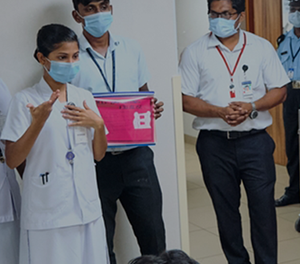

The department of Nuclear Medicine specialises in diagnostic tests and treatments using radioactive materials (radioisotopes). Nuclear medicine imaging is non-invasive and also unique, as it offers both integration of structural and functional details of organs. The major fraction of isotopes used in Clinical Nuclear Medicine is produced at BARC, Mumbai and the remaining is imported. Chemicals labelled with very small amounts of isotope, called radiopharmaceuticals are used for diagnosis and treatment.
Different radiopharmaceuticals are used for different tests. If the kidneys are to be evaluated, radiopharmaceuticals specific for the kidneys are used. The radiopharmaceuticals are injected into the patients, or administered as a capsule, and after few minutes / hours or days the patients are scanned with a special camera that provides images of radiopharmaceutical accumulation in the body. The special types of cameras used are the Gamma camera and PET-CT scanners with computer assistance to provide detailed images about the region of the body imaged.
In therapy for various ailments both malignant and benign, the radiopharmaceuticals go directly to the organ or diseased tissue being treated, and hence this is also termed targeted molecular therapy. Radiation safety methods are ensured during every procedure and the principle of ALARA (as- low- as- reasonably- achievable) radiation exposure is followed at every point.
I. TOWN CAMPUS
|
General OPD |
Time |
Days |
Location |
|
Morning OPD |
8:00 – 10:30 |
Mon and Thurs
|
NM dept and
|
|
Afternoon |
2:30 – 4:30 |
All weekdays |
NM dept |
|
|
|||
|
Private OPD |
Time |
Days |
Location |
|
Morning OPD |
8:00 – 10:30 |
Mon and
|
NM dept and
|
II. RANIPET campus
|
General OPD |
Time |
Days |
Location |
|
Morning OPD |
8:00 – 10:30 |
Mon and
|
NM dept (DOT |
|
Afternoon |
2:30 – 4:30 |
All weekdays |
NM dept (DOT |
|
|
|||
|
Private OPD |
Time |
Days |
Location |
|
Afternoon |
2:30- 4:30 |
Mon and |
NM dept (DOT |
TOWN CAMPUS
The Head,
Department of Nuclear Medicine
Room 1, 1st Floor, Main Building
Christian Medical College Vellore
Ida Scudder Road, Vellore – 632004
Tamil Nadu, India
RANIPET CAMPUS
The Head,
Department of Nuclear Medicine
B0005,Ranipet Campus
Christian Medical College Vellore
Ida Scudder Road, Vellore – 632517
Tamil Nadu, India
Email: nuclear@cmcvellore.ac.in
Reach us: 0416-228-2546
Working hours: Mon – Fri: 8 am to 4.30 pm
Sat: 8.00 am to 12.00 pm
Email us :
nuclear@cmcvellore.ac.in
04162282546
Mon-Fri: 8 am to 4.30 pm
( Sat : 8 am to 12:30 pm)